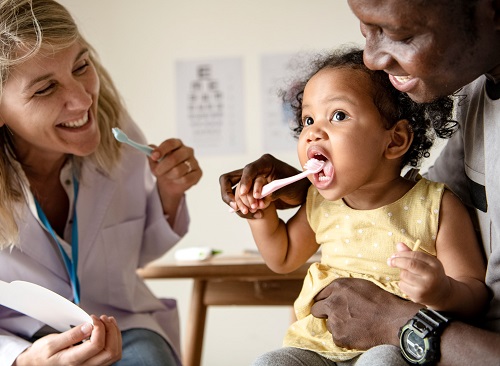Colorado Oral Health News – June 2023 – New Dental Director, Release of Oral Health Framework, New Website, and more!

Letter from the Oral Health Unit
Dear oral health champions,
This newsletter will feature some exciting news from the Oral Health Unit, including an introduction to our new state Dental Director, the release of a Framework to Advance Oral Health Equity in Colorado, upcoming network and community engagement opportunities, the launch of our new oral public health website, and finally, an invitation to engage with the new state oral health coalition!
The Oral Health Unit and CDPHE Welcomes Maryam Mahmood, DMD, MPH, as the State Dental Director.
It is with great pleasure that we announce Dr. Maryam Mahmood as Colorado’s next state Dental Director. CDPHE embarked on a comprehensive search and interview process over the course of a year to identify a new state Dental Director to lead many important initiatives to improve oral health. We are impressed by the range of experience Dr. Mahmood brings in oral public health, program implementation, data and evaluation, and community engagement. Dr. Mahmood has significant experience and knowledge in health equity, inclusion, diversity, and accessibility. We are excited to add her leadership to advancing important oral public health work across the state.
Dr. Mahmood was most recently the dental director at Sun Life Health, a Federally Qualified Health Center serving Pinal County in rural Arizona. She has experience partnering with schools to promote school-based oral health programs, working on collaboratives addressing chronic health issues such as diabetes in connection with oral health, and partnering with stakeholders to support underserved populations in intervention and prevention efforts.
In her new role in Colorado, she will collaborate with other state agencies and partner organizations to lead the implementation of Oral Health Equity Strategies and work in the Oral Health Unit in the Health Access Branch to advance evidence-based oral health strategies.
Dr. Mahmood’s expertise in and passion for oral health and oral health equity will be an asset as Colorado works to eliminate oral health inequities across the state.
The Framework to Advance Oral Health Equity in Colorado (“Framework”) Draft Release.
The Framework to Advance Oral Health Equity in Colorado is the culmination of nearly two year’s efforts among partners to establish a common vision and structure for oral health equity in Colorado. The Framework outlines key themes of the current state of oral health, and proposes a set of goals and strategies to achieve a multisector/multi-partner collaboration to eliminate oral health inequities in Colorado. Going forward, the contributors hope that the document guides collective and individual efforts of organizations each seeking better population oral health and greater oral health equity Of note, please make sure to review the data visualization companion to the Framework, “Oral Health in Colorado by the Numbers.”
Additional companion reports outlining the full planning process and all contributors will be posted to our new website soon.
Upcoming Oral Health Network Roundtable Discussions and Community Engagement Around the Framework
In order to ensure that the Framework aligns with community priorities, identifies strategies that are feasible at the community level, and builds towards successful implementation, CDPHE will complete a round of feedback from key stakeholders in a series of roundtable discussions, along with engaging community members and organizations in a series of community discussion. For the second round of community feedback, CDPHE would like to invite the oral health network as well as organizations and individuals who did not have the availability to participate in the first phase of development to a series of roundtable discussions. We hope you can make time in July or August to join a virtual Roundtable discussion. Your input in this next phase of strategic planning is crucial.
[link to sign up removed, expired]
The New Colorado Oral Health Website (ColoradoOralHealth.org) Has Launched!
The new ColoradoOralHealth.org website is a hub for information on oral health initiatives in Colorado, partner resources for supporting efforts within the Framework, and shared data and resources on oral public health strategies. In an effort to streamline information on programs the Oral Health Unit supports, the Colorado Oral Health website now hosts the Cavity Free at Three program, School-based Oral Health resources (Smart Mouths, Smart Kids), dental integration initiatives, community water fluoridation activities, and much more.
Sign Up to Get Involved in the Upcoming Oral Health Coalition for Colorado
A future Oral Health Coalition for Colorado is currently in development! A small workgroup of organizations and individuals are working to build a statewide and diverse coalition to improve oral health and equity. This workgroup has been meeting over the last several months in order to build the structure and processes needed for a successful coalition to launch. As efforts are continuing, and in order to expand participation to include additional interested partners, the Colorado Consumer Health Initiative (CCHI), the Oral Health Unit, and the Delta Dental of Colorado Foundation are collaboratively conducting outreach. [link to sign up removed, expired]
In addition to the exciting news coming from the Oral Health Unit this quarter, there is plenty to share about Oral Health in Colorado.
— The Oral Health Unit
National Updates
- Colorado is among states seeking approval for the use of a new fluoridation tablet feeder system for public water systems
Local departments of health across the U.S. are preparing to deploy a new, lower-cost water fluoridation tablet feeder system to reach more water consumers with the prevention benefit of optimally fluoridated drinking water. The system works by dissolving sodium fluorosilicate tablets in drinking water, similar to how chlorine is added to swimming pool water. The tablet system is expected to encourage more small and rural water systems to add fluoride to drinking water because the cost of implementation and maintenance is lower than previous approaches.
The patented feeder system has received NSF Standard 61 approval and several states, including Colorado, are currently in the process of obtaining approval for the feeder system.
Read the article from the American Dental Association for more about the tablet system. (link opens in a new window) - Safe drinking water PFAS
In June, the U.S. Environmental Protection Agency announced that it has lowered the lifetime health advisories in drinking water for four per- and polyfluoroalkyl substances (PFAS). Lifetime health advisories indicate the threshold of drinking water contamination where harmful health effects are unlikely to occur. These advisories serve to protect all people from detrimental health effects resulting from a lifetime of exposure to higher levels of PFAS in drinking water. Read the Environmental Protection Agency’s website in a new window.
PFAS are a family of chemicals used in some firefighting foams and other products. PFAS are present throughout the environment, and it is expected that most people have some level of these chemicals in their blood.
Visit the CDPHE PFAS website for more information on Colorado’s efforts to address PFAS.
If you have questions about the PFAS health advisories, text CO HELP at 303-389-1687 or call 1-877-462-2911. - City of Durango Water Treatment Plant Video
Are you curious about how water facilities produce safe drinking water? The City of Durango has created a video providing a behind-the-scenes look into their water treatment plant production efforts. Watch their video on youtube. Link opens in a new window. - HPV Vaccine and Oral Health Research
A recent article published in the Journal of the American Dental Association (JADA) highlights the importance of the human papillomavirus (HPV) vaccine in preventing oral and oropharyngeal cancers and the role of oral health professionals in HPV prevention efforts. Over half of the surveyed adults expressed a favorable view regarding discussions about HPV education and vaccination with oral health clinicians. By increasing awareness of how HPV can impact oral health, conversations with oral health clinicians can improve patients’ understanding of why the HPV vaccine is important in preventing types of cancers and maintaining optimal oral health for a lifetime. Access the full article here (link opens in a new window).Researchers have recently analyzed survey data on reasons given as to why parents in the U.S. have decided not to vaccinate their child against HPV from 2010 to 2020. Some of the most common concerns raised by parents hesitant to vaccinate their children include perceptions on necessity and safety of the vaccine, a lack of recommendation by a healthcare professional, a lack of knowledge about the vaccine, and a lack of necessity due to their child’s sexual inactivity. Most of these concerns have declined in prevalence since 2010, while concerns over vaccine safety have significantly increased. Interventions addressing vaccine safety concerns may help decrease vaccine hesitancy and increase uptake. Learn more by reading the article (link opens in a new window). - Mental Health Awareness Month
May was National Mental Health Awareness Month. Behavioral health conditions are often associated with other behavioral and social risk factors, such as neglected oral hygiene, malnutrition, high-sugar diets, houselessness, and sporadic dental appointment patterns, that can lead to poor oral health outcomes. In 2021, the Colorado Behavioral Health Administration established the I Matter program to provide access to up to six free therapy sessions for all youth in Colorado. Following the six free sessions, the program connects youth to a care navigator to ensure ongoing care. Youth ages 18 and younger, or 21 and younger if receiving special education services, are eligible to participate, and Spanish sessions and language services are available. To read more about the I Matter program, visit this website (opens in a new window). Link opens in a new window.
Also in May, the National Substance Abuse and Mental Health Services Administration (SAMHSA) celebrated the 10 year anniversary of their substance abuse awareness campaign titled, “Talk. They Hear You.” The campaign is designed to help parents, caregivers, educators, and community members access information, resources, and action plans to prevent underage drinking and other substance use. Visit the website here to learn more about the campaign and available resources. Link opens in a new window.
Stories from the Field
- April Head and Neck Cancer Awareness Month
In April, the Colorado Cancer Coalition HPV Vaccination Task Force, in collaboration with the Alliance for HPV Free Colorado and Children’s Hospital Colorado School Health Program, hosted a monthly peer-sharing call related to HPV vaccination efforts in Colorado. Attendees shared collaboration efforts between the Alliance, dental professionals, and school-based health center staff, as well as current efforts and best practices in HPV vaccination and education outreach. To learn more about adult perceptions about the importance of the HPV vaccine in preventing cancers and oral health clinicians’ role in HPV prevention and identified associated factors, read this article from the Journal of the American Dental Association (ADA) (link opens in a new window). Additional ADA resources about head and neck cancer are available here (link opens in a new window).
Partner Links
- Primary Care Office Opens Request for Applications (RFA) for the Practice-based Health Education Grant Program
The grant program aims to increase practice-based training opportunities for health professions students in order to complete degree requirements and gain hands-on experience in pursuit of a license in the healthcare field. Eligible applicants include private for-profit or nonprofit organizations that seek to increase clinical practice-based training capacity and quality programs for health professions students. This includes healthcare employers, accredited education organizations, health care education training programs, Colorado medical schools, and ACGME-accredited residency programs.
Applications for Cohort 2 funding must be submitted no later than 5 PM MDT on July 31, 2023.
Details on the RFA, required attachments, and guidance documents are available on the Practice-based Health Education Grants Program website. (link opens in a new window) - Rocky Mountain Public Media Launches Comprehensive Oral Health Campaign for Colorado’s Early Childhood Audience
Delta Dental of Colorado Foundation (DDCOF) had awarded the Rocky Mountain Public Broadcast Service (RMPBS) a three-year, $590,000 grant to produce a series of educational oral health videos, specifically tailored for young children. As part of the DDCOF’s prevention initiative, this video series aims to equip parents and caregivers of children aged zero to six with valuable information and resources to foster positive oral health habits early in life.
RMPBS, with its extensive reach, covering 99% of households in Colorado through its broadcast, radio, and digital platforms, will play a pivotal role in promoting this series. RMPBS will collaborate with other education media organizations to align messaging and strengthen collective efforts. The campaign is expected to engage at least 600,000 individuals yearly from the intended audience. To catch a glimpse of the first episode as well as access other educational materials, visit deltadentalkids.com. Link opens in a new window.
- Learn New Painkiller Recommendations – 1 CE Credit
A soon-to-be-published ADA guideline identifies how to responsibly use opioids, acetaminophen, ibuprofen, and other painkillers to safely manage acute dental pain. In the meantime, a Continuing Education (CE) course is available to learn more about the latest guidance. Enroll now in the free online CE course and get a sneak peek of the guideline’s recommendations. Link opens in a new window.

Prenatal, Infant, & Toddler
- Cavity Free at Three Website
Though the Cavity Free at Three website has a new look and website address, we are still available! Cavity Free at Three can now be found on the new ColoradoOralHealth.org website (link opens in a new window)! Please bookmark this new website to find resources, request for trainings, the contact us form for technical assistance, and more! - Cavity Free at Three Dental Curriculum
The new Cavity Free at Three dental curriculum is currently in the piloting phase. The Oral Health Unit has piloted the update curriculum at two dental practices thus far, and is looking for a third dental pilot site to participate in training and provide feedback. The dental curriculum is broken up into two different portions; an online, self-paced module, and a one-hour Zoom skill-building session with a Master Trainer.
The concepts in the new Cavity Free at Three curriculum include:- Current care recommendations for infants, toddlers, and pregnant patients.
- Social determinants of oral health.
- Patient-centered approaches to the six essential services, including having patient-centered Cavity Free at Three conversations, partnering with parents/caregivers for self-management goal-setting, and incorporating techniques such as motivational interviewing.
If you know of any dental practices that may be interested in participating as a pilot site, please reach out to leah.brunner@state.co.us.

- New Resource! National Network for Oral Health Access’s Integration of Behavioral and Oral Health User’s Guide
The National Network for Oral Health Access (NNOHA) released a new resource in June detailing their framework for integration of behavioral and oral health. Read the Integration of Behavioral and Oral Health User’s Guide on NNOHA’s website (link opens in a new window), which builds upon the increased demand and need for behavioral health services as a result of the COVID-19 pandemic, among other factors. Integration of oral health and other healthcare disciplines is increasingly seen as a necessity in order to create a continuum of care and increase access to care while contributing to positive health outcomes. Integration with behavioral health is especially important as many behavioral health conditions, such as substance use and depression, can contribute to poor oral health, and vice versa. The goal of this guide is to support community health center dental programs in implementing interprofessional collaboration between behavioral health and dental departments.


